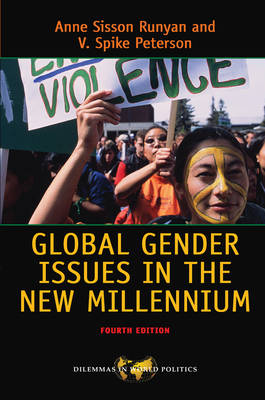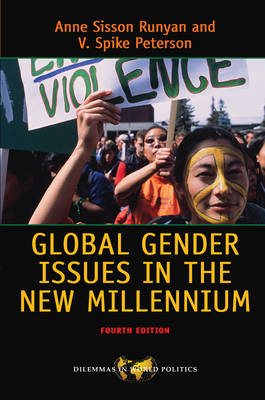
Je cadeautjes zeker op tijd in huis hebben voor de feestdagen? Kom langs in onze winkels en vind het perfecte geschenk!
- Afhalen na 1 uur in een winkel met voorraad
- Gratis thuislevering in België vanaf € 30
- Ruim aanbod met 7 miljoen producten
Je cadeautjes zeker op tijd in huis hebben voor de feestdagen? Kom langs in onze winkels en vind het perfecte geschenk!
- Afhalen na 1 uur in een winkel met voorraad
- Gratis thuislevering in België vanaf € 30
- Ruim aanbod met 7 miljoen producten
Zoeken
Omschrijving
Global Gender Issues in the New Millennium argues that the power of gender works to help keep gender, race, class, sexual, and national divisions in place despite increasing attention to gender issues in the study and practice of world politics. Accessible and student-friendly for both undergraduate and graduate courses, authors Anne Sisson Runyan and V. Spike Peterson analyze gendered divisions of power and resources that contribute to the worldwide crises of representation, violence, and sustainability. They emphasize how hard-won attention to gender equality in world affairs can be co-opted when gender is used to justify or mystify unjust forms of global governance, international security, and global political economy.In the new and updated fourth edition, Runyan and Peterson examine the challenges of forging transnational solidarities to de-gender world politics, scholarship, and practice through renewed politics for greater representation and redistribution. Yet they see promise in coalitional struggles to re-radicalize feminist world political demands to change the downward conditions of women, men, children, and the planet. Updated to include framing questions at the opening of each chapter, discussion questions and exercises at the end of each chapter, and updated data on gender statistics and policymaking. Chapters One and Two have also been revised to provide more support to readers with less of a background in gender politics. Case studies and web resources are now also provided.
Specificaties
Betrokkenen
- Auteur(s):
- Uitgeverij:
Inhoud
- Aantal bladzijden:
- 356
- Taal:
- Engels
- Reeks:
Eigenschappen
- Productcode (EAN):
- 9780367097943
- Verschijningsdatum:
- 13/06/2019
- Uitvoering:
- Hardcover
- Formaat:
- Genaaid
- Afmetingen:
- 152 mm x 229 mm
- Gewicht:
- 644 g

Alleen bij Standaard Boekhandel
+ 549 punten op je klantenkaart van Standaard Boekhandel
Beoordelingen
We publiceren alleen reviews die voldoen aan de voorwaarden voor reviews. Bekijk onze voorwaarden voor reviews.









